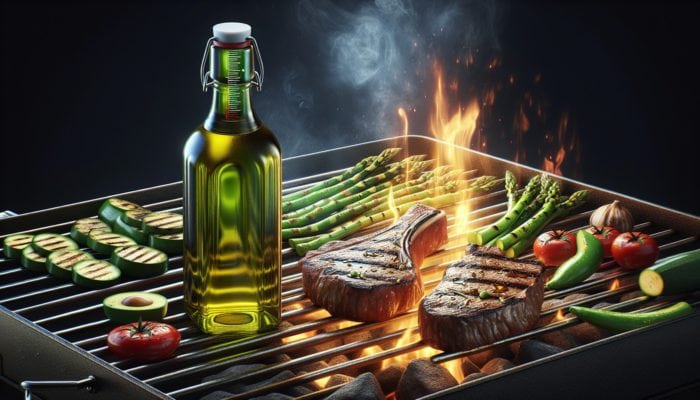Master the Art of Selecting the Ideal Oils for Exceptional High-Heat Grilling
Discover Why Avocado Oil Reigns Supreme for High-Temperature Grilling

Avocado oil stands out as an exceptional choice for high-heat grilling, celebrated for its remarkable high smoke point of approximately 520°F (271°C). This advantageous quality enables you to achieve that enviable perfect sear on meats while creating a tantalising char on vegetables, all without the anxiety of burning your food. In addition to its cooking benefits, avocado oil is rich in monounsaturated fats, which are linked to promoting heart health and reducing levels of bad cholesterol. Furthermore, its delicate, buttery flavour elevates the natural taste of grilled dishes, making it versatile enough for a wide range of options, from succulent fish and steak to delicious grilled fruits.
To fully harness the benefits of avocado oil while grilling, consider marinating your proteins prior to cooking. This method not only infuses rich, intense flavour but also effectively tenderises the meat. A simple yet delightful marinade can be crafted by combining avocado oil with citrus juice and fresh herbs, significantly enhancing your overall grilling experience. Moreover, applying avocado oil directly onto your grill grates can prevent sticking, ensuring that your meals come off the grill beautifully intact and ready to be enjoyed.
Uncover the Reasons Peanut Oil is the Go-To Choice for Delicious Grilling
Peanut oil has become a staple among grilling aficionados due to its neutral flavour and impressive high smoke point, typically around 450°F (232°C). This oil is particularly effective for grilling a diverse array of foods, especially when the goal is to allow the ingredients to shine rather than the oil itself. Its stability at elevated temperatures ensures it remains intact without breaking down, providing a clean and enjoyable cooking experience with every use.
One of the most effective uses for peanut oil is in Asian-inspired grilled dishes, where its nutty undertones beautifully complement marinated chicken skewers or grilled shrimp. Additionally, when utilised for frying or stir-frying after grilling, peanut oil can impart a delightful crunch to both vegetables and meats. Its versatility and reliability solidify peanut oil as a kitchen essential for many chefs, facilitating a seamless transition from grilling to other cooking methods without compromising flavour integrity.
Explore the Unique Qualities That Make Grapeseed Oil Perfect for Grilling
Grapeseed oil is another outstanding option for high-heat grilling, featuring a smoke point of around 420°F (216°C). This oil boasts a mild flavour that enhances your grilled foods without overpowering their natural characteristics. Its light texture is ideal for brushing onto grill grates, promoting even cooking while preventing sticking.
Utilising grapeseed oil as a base for marinades can significantly elevate your grilling results. It blends excellently with a variety of herbs and spices, allowing for creative and flavourful combinations. For example, a marinade that includes grapeseed oil, garlic, and rosemary can add an irresistible aroma to grilled vegetables or meats. Additionally, its high vitamin E content offers numerous health benefits, making it a wise choice for health-conscious grillers looking to enhance their meals without sacrificing flavour.
Gain Invaluable Insights from Experts on the Ideal Oils for High-Heat Grilling

Why Do Culinary Experts Advocate for Avocado Oil in Grilling?
Culinary experts consistently advocate for avocado oil in high-heat grilling due to its extraordinary smoke point and myriad health benefits. The composition of heart-healthy fats found in avocado oil makes it the ideal choice for those prioritising wellness while cooking. Here are some specific recommendations for effectively incorporating avocado oil into your grilling routine:
- Employ avocado oil for marinating meats, enhancing both flavour and tenderness.
- Brush it onto vegetables to achieve a delightful char while preventing sticking.
- Integrate it into salad dressings to provide a fresh, vibrant finish to grilled meals.
- Experiment with flavoured avocado oils, such as garlic or chili, to add complexity and excitement to your dishes.
By following these expert tips, you can fully leverage the properties of avocado oil, ensuring your grilled dishes are not only delicious but also healthful. Experts agree that incorporating avocado oil into your grilling practices can significantly enhance your cooking outcomes, making every meal a delightful culinary experience.
How Does Peanut Oil Shine in Grilling Techniques?
Peanut oil excels in grilling due to its high smoke point and stability at elevated temperatures. This reliability allows for consistent heat application, which is crucial for achieving perfect grill marks on both meats and vegetables. Many chefs value peanut oil for its ability to withstand high heat without breaking down, ensuring that flavours remain vibrant throughout the cooking process.
For optimal grilling techniques using peanut oil, consider these expert insights. Begin by utilising it for direct grilling of proteins like chicken or pork, allowing the oil’s neutral flavour to enhance the dish rather than overpower it. When grilling vegetables, lightly toss them in peanut oil to prevent sticking and ensure even cooking. Lastly, incorporating peanut oil into a basting sauce can add an extra layer of flavour, particularly when paired with spices or marinades. This versatility makes peanut oil a reliable ally in the grilling process.
What Advantages Does Grapeseed Oil Provide for Grilling?

Grapeseed oil is highly regarded for grilling due to its high smoke point and mild flavour profile. These attributes render it a versatile option that enhances the natural flavours of grilled foods without overshadowing them. For grilling enthusiasts, grapeseed oil offers a range of applications that can elevate their dishes to new culinary heights.
To fully maximise the benefits of grapeseed oil while grilling, consider using it as a marinade base, mixing it with herbs and spices to create a flavourful soak for meats. Its light texture also allows it to be used effectively as a spray oil on grill grates, ensuring even coverage and preventing sticking. When grilling delicate items like fish, grapeseed oil delivers a non-intrusive flavour, allowing the primary ingredients to shine. By following these expert recommendations, you can fully harness grapeseed oil’s unique properties for an enhanced grilling experience.
Discover the Health Benefits of Premium High-Heat Grilling Oils
What Health Benefits Are Offered by Avocado Oil?
Avocado oil is abundant in numerous health benefits, primarily due to its rich composition of monounsaturated fats and antioxidants. These valuable components can significantly contribute to overall well-being. For instance, the high levels of healthy fats present in avocado oil are known to promote heart health by lowering bad cholesterol levels. Additionally, avocado oil is rich in antioxidants, which aid in combating oxidative stress within the body.
Here are some key health benefits associated with avocado oil:
- Rich in heart-healthy monounsaturated fats.
- Contains antioxidants that combat free radicals.
- Enhances nutrient absorption from other foods.
- May reduce inflammation and support joint health.
Incorporating avocado oil into your grilling routine not only enhances the flavours of your meals but also delivers essential health advantages, making it a wise choice for any health-conscious griller.
How Does Peanut Oil Contribute Positively to Health?
Peanut oil serves as a versatile grilling option and offers numerous health benefits. Its composition includes healthy fats and vitamin E, both of which are crucial for maintaining good health. The monounsaturated fats in peanut oil can promote heart health by encouraging healthy cholesterol levels and reducing the risk of cardiovascular diseases.
Furthermore, peanut oil is rich in vitamin E, a powerful antioxidant that plays a vital role in immune function and skin health. Regular consumption of peanut oil can lead to improved skin elasticity and overall well-being. Its ability to withstand high temperatures without breaking down makes it an ideal choice for grilling, ensuring that health benefits remain intact while you prepare delectable meals.
What Nutritional Benefits Does Grapeseed Oil Provide?
Grapeseed oil is recognised for its rich content of polyunsaturated fats and vitamin E, both of which provide distinct health advantages. The oil’s polyunsaturated fat profile can support cardiovascular health and assist in maintaining healthy cholesterol levels. Additionally, grapeseed oil is an excellent source of vitamin E, which is essential for skin health and may aid in reducing inflammation throughout the body.
Beyond its heart-healthy properties, grapeseed oil can promote skin healing and may improve the appearance of scars. When used in cooking, it retains its beneficial properties even at high temperatures, making it an excellent choice for health-conscious grilling. Incorporating grapeseed oil into your meals adds not only flavour but also vital nutrients that support overall wellness.
What Health Benefits Does Safflower Oil Provide?
Safflower oil may be lesser-known, but it is highly beneficial, being rich in omega-6 fatty acids and vitamin E. These components can improve blood sugar levels and promote cardiovascular health, making safflower oil a valuable addition to your grilling repertoire. Its high smoke point also makes it suitable for high-heat grilling, allowing for various cooking applications.
Integrating safflower oil into your grilling practices can foster healthier meals. Its neutral flavour allows it to blend seamlessly with spices and marinades, enhancing the overall taste of grilled dishes. Furthermore, the vitamin E content in safflower oil contributes to skin health and bolsters the immune system, making it a nutritious choice for your grilling needs.
How Does Sunflower Oil Enhance Your Health?
Sunflower oil is another fantastic option for grilling, known for being rich in healthy fats, vitamin E, and phytosterols. These components work synergistically to support heart health by lowering cholesterol levels and promoting better cardiovascular function. The oil’s light flavour profile makes it an ideal choice for a variety of dishes, ensuring that the natural flavours of grilled foods are preserved.
Additionally, sunflower oil possesses anti-inflammatory properties that can contribute to overall health. By incorporating sunflower oil into your grilling routine, you reap its nutritional value while enjoying flavourful meals. Whether used as a marinade or brushed onto grill grates, sunflower oil’s versatility and health benefits solidify it as an essential addition to any grilling repertoire.
Crucial Tips for Picking the Right Oil for Grilling
What Key Factors Should You Consider When Selecting an Oil for Grilling?
Choosing the right oil for grilling necessitates careful consideration of multiple factors to ensure optimal results. Key aspects to evaluate include the oil’s smoke point, flavour profile, and nutritional content. Each of these elements plays a critical role in how effectively the oil performs during the grilling process.
When selecting grilling oils, consider the following factors:
- Smoke point: Ensure the oil can withstand high temperatures without breaking down.
- Flavour profile: Choose an oil that complements the dish you are preparing.
- Nutritional content: Opt for oils rich in healthy fats and vitamins.
- Cost and availability: Take into account your budget and access to different oils.
By weighing these factors, you can make a well-informed decision that enhances your grilling experience while promoting healthful eating.
How Does Smoke Point Influence Grilling Performance?
The smoke point of an oil is a vital factor determining its suitability for high-heat grilling. Oils with lower smoke points can burn and produce harmful compounds, adversely affecting the flavour of your food while potentially posing health risks. For effective grilling, it is essential to use oils with a high smoke point that can withstand intense heat without degrading.
When grilling, oils such as avocado, peanut, or grapeseed oil are excellent choices due to their high smoke points. They enable you to achieve that ideal sear on meats and vegetables while imparting delicious flavours. Understanding the smoke point of your chosen oil can elevate your grilling technique and ensure that your meals are both flavoursome and safe to consume.
What Impact Does Flavour Have on Selecting Grilling Oils?
Flavour is a crucial factor in selecting grilling oils, as it can either enhance or overshadow the natural taste of your food. Choosing an oil with a complementary flavour profile is critical for creating delicious grilled dishes. For instance, oils like avocado and grapeseed have mild flavours that can enhance other ingredients without overwhelming them.
When selecting an oil, consider how its flavour will interact with the main ingredients. A robust oil may pair well with hearty meats, while lighter oils are more suited for delicate fish or vegetables. By thoughtfully considering the flavour of the oil in relation to your dish, you can ensure a harmonious balance that elevates your grilling experience.
How Does Nutritional Content Affect Oil Selection for Grilling?
The nutritional content of an oil significantly affects its selection for grilling, particularly for health-conscious individuals. Oils rich in beneficial nutrients such as healthy fats, vitamins, and antioxidants contribute to the overall healthiness of grilled meals. When choosing oils for grilling, prioritise those with favourable nutritional profiles that align with your dietary goals.
For example, oils like avocado and grapeseed offer heart-healthy monounsaturated fats and antioxidants beneficial to overall well-being. In contrast, oils high in saturated fats may not be the best choice for health-minded grillers. By considering the nutritional content of your selected oils, you can create meals that are not only delicious but also nourishing.
Is It Safe to Reuse Oil for Grilling?
Reusing oil for grilling can be a cost-effective practice, but it requires careful consideration to ensure safety. Oils degrade over time and can develop off-flavours or harmful compounds, particularly if they have been subjected to high heat multiple times. To safely reuse oil for grilling, ensure it is properly stored and filtered.
After grilling, allow the oil to cool before straining it through a fine mesh sieve or cheesecloth to remove food particles. Store the filtered oil in a dark, cool place to prolong its shelf life. However, keep in mind that even with proper storage, the oil should ideally be used within a few weeks. Always assess the oil’s smell and colour before using it again; if it smells rancid or appears cloudy, it is best to discard it.
Proven Strategies for Optimal Use of Oils in High-Heat Grilling
How to Fully Leverage the Benefits of Avocado Oil in Grilling?
To maximise the advantages of avocado oil, consider using it for both marinating and basting grilled foods. Its high smoke point allows it to withstand intense heat without burning, making it an ideal choice for a variety of grilling techniques. Start by creating a flavourful marinade that includes avocado oil, fresh herbs, garlic, and citrus juice. This not only infuses rich flavour but also helps tenderise meats effectively.
While grilling, employ avocado oil for basting during the cooking process to keep your meats moist and add layers of flavour. Simply brush the oil over your food as it grills, allowing it to caramelise and create a beautiful crust. Additionally, integrate avocado oil into your sauces or dressings served alongside grilled dishes for an extra boost of flavour and nutrition, making every meal a delightful experience for your guests.
What Are the Best Practices for Incorporating Peanut Oil in Grilling?
The versatility of peanut oil makes it an excellent choice for both marinating and direct grilling. To use peanut oil effectively, begin by marinating your proteins for at least 30 minutes, allowing the oil to infuse flavour. Combine peanut oil with soy sauce, ginger, or garlic for an Asian-inspired twist that beautifully complements grilled chicken or shrimp.
When grilling, consider using peanut oil as a finishing oil. After grilling, drizzle a small amount over your dish to enhance the nutty flavour. This technique works particularly well with grilled vegetables or seafood, ensuring each bite is memorable. Moreover, peanut oil can also be utilised for stir-frying leftover grilled items, ensuring that no flavour goes to waste while providing a seamless transition from grilling to another cooking method.
How to Effectively Use Grapeseed Oil in Grilling?
Grapeseed oil can be effectively utilised in grilling by using it as a spray or brush-on oil. This ensures even coverage and enhances flavour without overshadowing the natural tastes of the food. Start by lightly spraying grapeseed oil onto your grill grates to prevent sticking and promote even cooking, which is essential for achieving those perfect grill marks that everyone loves.
In addition to its application on grill grates, grapeseed oil is perfect for creating marinades or dressings. Mix grapeseed oil with herbs, spices, and vinegar to create a vibrant dressing that can be brushed on meats or vegetables before grilling. Furthermore, drizzling grapeseed oil over grilled dishes before serving provides a finishing touch that enhances both the visual appeal and flavour of your meal, ensuring a delightful dining experience for all.
Avoid Common Mistakes When Grilling with Oils
What Dangers Are Associated with Using Inappropriate Oil for Grilling?
Utilising oils with low smoke points can lead to significant cooking mishaps, such as burning food and generating harmful compounds. This not only impacts the flavour and texture of your meal but may also pose health risks. Oils like olive oil may be suitable for sautéing but are not recommended for high-heat grilling due to their lower smoke point, which can compromise the quality of your dishes.
Choosing the right oil is crucial for achieving flavourful, well-cooked meals. Always opt for oils specifically designed for high-heat applications, such as avocado, peanut, or grapeseed oil, to avoid compromising the quality and safety of your grilled dishes. Adopting this precaution ensures that your grilling experience is both enjoyable and health-conscious, enabling you to savour every bite of your creations.
What Effects Can Excessive Oil Use Have on Your Grilling Results?
Overusing oil while grilling can lead to various issues, including flare-ups and greasy food. Excess oil can ignite flames that make it difficult to control the cooking process, resulting in burnt or unevenly cooked meals. Furthermore, an overabundance of oil can cause food to become excessively greasy, detracting from the intended flavours of the ingredients.
To avoid these complications, practice moderation when applying oil. A light coating is typically sufficient for preventing sticking and enhancing flavour. For best results, consider using a brush or spray to evenly distribute the oil, ensuring your meals are delicious without being overly oily, creating a more enjoyable cooking and dining experience for everyone involved.
What Are the Consequences of Skipping the Preheating Step for the Grill?
Failing to preheat the grill can result in uneven cooking and food sticking to the grates, which significantly affects your grilling experience. When the grill isn’t adequately hot, food can cling to the grates, making it challenging to achieve those desirable grill marks. Although proper oil application can help mitigate these issues, preheating remains essential for successful grilling.
To ensure optimal grilling results, allow your grill to reach the appropriate temperature before placing any food on it. A preheated grill not only creates a sear that locks in moisture but also enhances the overall flavour and texture of your dishes. This straightforward step can dramatically improve your grilling outcomes, making your cooking process much more efficient and enjoyable.
Techniques for Elevating Flavour with Grilling Oils
How Can You Infuse Oils with Aromatic Herbs and Spices?
Infusing oils with herbs and spices is an excellent technique for amplifying the flavour of your grilled foods. By infusing oils before grilling, you can create unique flavour profiles that elevate your dishes to new levels. Start by gently heating your chosen oil, such as avocado or grapeseed, and adding fresh herbs, garlic, or chillies. Allow the mixture to simmer on low heat for about 10 minutes, then strain out the solids for a delightful infusion.
Once your oil is infused, use it as a marinade for meats or vegetables, or brush it onto your food before grilling. The infused oil will impart a delightful aroma and flavour that complements the natural tastes of the ingredients. Experimenting with different herbs and spices allows you to customise your infusions to suit your preferences, making your grilled meals more exciting and flavourful while impressing your guests.
Which Oils Are Most Effective for Marinating Grilled Foods?
When it comes to marinating, oils like avocado and peanut oil excel due to their ability to withstand high heat and enhance flavour. The creamy texture of avocado oil helps spices and seasonings adhere effectively, creating a well-balanced marinade. Combine avocado oil with citrus juice or vinegar for a zesty marinade that works beautifully with chicken or fish, delivering a fresh and vibrant taste.
Peanut oil also serves as an excellent option for Asian-inspired marinades, as its neutral flavour allows it to blend seamlessly with other ingredients. Consider mixing peanut oil with soy sauce, sesame oil, and ginger for a vibrant marinade that infuses flavour into grilled meats and tofu. Both oils significantly contribute to the tenderness of the food, making them ideal choices for marinating before grilling, ensuring a mouthwatering result.
How to Use Oils Effectively to Prevent Sticking?
Applying a thin layer of oil to the grill grates is a simple yet effective technique to prevent food from sticking during grilling. This method is especially beneficial when working with lean proteins or delicate vegetables that are prone to sticking. Use a paper towel or cloth dipped in oil to wipe down the grates before preheating the grill for optimal results, ensuring a smooth cooking process.
Additionally, consider lightly coating the food itself with oil before placing it on the grill. This practice not only helps prevent sticking but also promotes even cooking and enhances flavour. By combining these techniques, you can ensure that your grilled dishes come off the grill perfectly intact, creating a more enjoyable cooking and dining experience for everyone involved.
Frequently Asked Questions about Grilling Oils
What is the top oil for high-heat grilling?
Avocado oil is widely recognised as one of the premier oils for high-heat grilling due to its high smoke point and heart-healthy characteristics, making it ideal for searing meats and achieving flavourful results.
Can I use olive oil for grilling?
While olive oil boasts various health benefits, its lower smoke point makes it less suitable for high-heat grilling. It is better suited for low to medium heat cooking applications, where its flavour can shine without burning.
Is peanut oil a healthy option for grilling?
Yes, peanut oil is a healthy choice for grilling as it contains monounsaturated fats and vitamin E, both of which contribute to heart health while providing a stable option for high-heat cooking.
Should I oil the grill grates before cooking?
Absolutely, oiling the grill grates before cooking helps prevent sticking and ensures even cooking, which is essential for achieving perfect grill marks on your food and enhancing overall flavour.
How long can I safely store reused grilling oil?
Reused grilling oil can be stored for a few weeks if filtered properly and kept in a cool, dark place. Always check for off smells or discolouration before using it again to ensure safety.
Can I mix different oils for grilling purposes?
Yes, mixing different oils can create unique flavour profiles and adjust the smoke point. Just ensure that all oils used are suitable for high-heat applications to avoid burning.
What is the smoke point of grapeseed oil?
Grapeseed oil has a smoke point of approximately 420°F (216°C), making it an excellent choice for high-heat grilling and frying without breaking down, ensuring the best cooking results.
How do I determine if my oil has gone bad?
If your oil smells rancid, has an off-colour, or appears cloudy, it has likely gone bad and should be discarded to ensure safe cooking practices and maintain the quality of your meals.
What are some alternatives to high-heat oils?
Alternatives to high-heat oils include safflower oil and sunflower oil, both of which have high smoke points and beneficial health properties, making them suitable for grilling.
Can I use flavoured oils for grilling?
Yes, flavoured oils can add depth to your grilled dishes. Just ensure that they have a suitable smoke point for grilling to avoid burning the flavours, allowing you to enjoy a variety of tastes.
Connect with Us on Facebook for More Grilling Tips!
The Article Best Oils for High-Heat Grilling: Top Picks for BBQ appeared first on https://pitmastersarsenal.com
The Article Top Picks for High-Heat Grilling Oils: Best BBQ Options Was Found On https://limitsofstrategy.com



